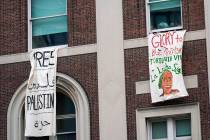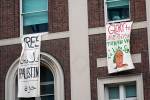Easy money
Problems inherent in the October rush by Congress to "do something" about the faltering economy have now become patently obvious.
Has the $700 billion bailout package -- put together in a frenzied whirlwind that swept away all reasoned debate -- actually done any good?
If so, it's hard to pinpoint the specifics.
And now, The Associated Press reports that most of the banks which bellied up to the trough to get their hands on "emergency" bailout money courtesy of the taxpayers won't even come clean about what they've done with it.
"We're choosing not to disclose that," Kevin Heine, spokesman for Bank of New York Mellon, which received about $3 billion, told The AP.
A query of JPMorgan Chase, which walked off with about $25 billion, was met with a similar response. "We have not disclosed that to the public. We're declining to," said spokesman Thomas Kelly.
All in all, 21 banks declined to provide specifics, some arguing they manage capital in "aggregate," making it difficult to prove dollar-by-dollar tracking.
Yes, there was always the danger that congressional micromanagement of the funds would hinder any effectiveness the money might have.
But it's hardly micromanagement to expect that financial institutions which accept taxpayer bailout money be prepared to make public at least a minimal accounting of those funds.
Perhaps if Congress had acted with deliberative forethought rather than politically expedient haste, taxpayers would have a better idea of what has happened to $350 billion of their own money.























